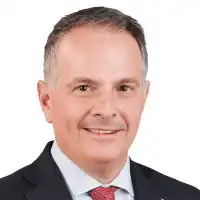Home>Ken Weinstein, from the Latin Quarter to Washington's Corridors of Power
12.02.2020
Ken Weinstein, from the Latin Quarter to Washington's Corridors of Power

December marked 20 years at the Hudson Institute for its president and CEO, Ken Weinstein. To celebrate, the Washington-based think tank sent out a newsletter highlighting his accomplishments, featuring photos of Weinstein with top American and foreign government officials—Henry Kissinger, Nicolas Sarkozy, and Shinzo Abe, among others.
That he would end up a key policy maker in Washington would have been surprising for Weinstein when he was a student at Sciences Po. This alumnus of the DEA in Soviet Studies arrived in Paris expecting to pursue a career teaching political theory, not rubbing shoulders with world leaders on a regular basis.
Weinstein was an American at Sciences Po before international students flocked to the school. Besides American undergraduates on exchange, many of whom were auditors, he was one of the few Americans to earn a graduate degree there in 1986.
“They were intrigued there was an American,” he said.
Weinstein integrated himself into Sciences Po student life, studying and socializing in French. And he fondly recounts vacations to visit his DEA classmates across Europe—and their visits to the United States. These friends have kept in touch during the three intervening decades, and they have even gotten to know each other’s children.
“We’ve all been through up and downs in our lives together,” he said.
These days, he even engages with former professors in his line of work. Thirty-two years following his studies at Sciences Po, Weinstein bumped into his former professor Jacques Rupnik at a forum hosted by Hudson and the Institut Montaigne. And he says that one of the best seminars he ever took on political theory, as an undergraduate or graduate student, was at Sciences Po.
But the bonds Weinstein formed with his classmates and instructors also helped him to view the world in the context of a distinct French strategic culture, which serves him well in policy debates and analysis today.
“What impressed me most about students at Sciences Po was that their culture generale, their deep knowledge of history and of policy. I was amazed. People would be able to tell you about the subparts of the Treaty of Rome, when NATO was formed. They knew 20th century history, they knew 19th century history, they knew 18th century history, as well as strategy and literature,” he said.
This more holistic understanding of politics still stands in stark contrast to the gaps in the traditional American systems-based approach to teaching international relations.
“Knowing, say, Waltz or Keohane gives you no serious basis to understand the critical dilemmas policymakers need to make daily about what is possible in the world of international affairs,” he said in a 2018 speech.
Weinstein says that Sciences Po emphasizes the nuts and bolts of how the world works; the other approach provides developed, but not entirely helpful, frameworks for interpreting international events.
After finishing his dissertation and graduating, Weinstein went on to a couple of different think tanks, working on domestic and foreign policy issues, and eventually returning to Hudson in 1999 as director of its Washington office. He has remained there since.
True to its mission, Sciences Po also helped prepare Weinstein for government service. In addition to his job at Hudson, he serves as chairman of the U.S. Agency for Global Media, the broadcasting board that oversees Radio Free Europe and other international media outlets sponsored by the U.S. government, as well as a member of the Advisory Committee for Trade Policy and Negotiations, the senior advisory board for the U.S. Trade Representative.
Between meeting world leaders and overseeing governance of America’s civilian international media, Weinstein credits Sciences Po with instilling in him “an appreciation of foreign cultures, of understanding the limitations of the Washington echo chamber, and how different countries perceive foreign affairs differently than we do, depending on their national interest and security environment.”
No doubt, this has been crucial as the Hudson Institute has expanded its global footprint, also playing a role in policy debates in foreign countries. And as he celebrates two decades at the think tank, he has plenty of accomplishments to look back on.
“I feel so incredibly blessed. I’ve worked with some of the most interesting policy makers here in Washington and around the world, and gotten to know them well. It’s like being captain of Paris Saint-Germain,” he said.